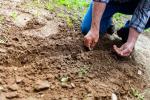Biodiversity Foundation Project: Corridors for adaptation to climate change of pollinator populations
- Type Project
- Execution 2021
- Scope Europeo
- Main source of financing Biodiversity Foundation
- Project website Web proyecto (Fundación Biodiversidad)
The project has contributed to improving the conservation status of pollinator populations by increasing the availability, quality, and connectivity of their habitats to help them adapt to climate change. A network of gardens has been established, natural vegetation patches have been created for pollinator shelter, feeding, and dispersal, and nesting sites have been installed to promote bee nesting.
The initiative included 19 volunteer activities with 280 participants and 97 environmental education sessions with nearly 2,300 students. A total of 10 municipalities joined a Network of Municipalities for the Adaptation of Pollinators to Climate Change. Pollination is an ecosystem service essential for the conservation of biodiversity, the functioning of ecosystems, and agricultural production.
Restoration or establishment of corridors in agricultural areas, as well as feeding areas (for pollinators) during unfavorable seasons through the establishment of long-flowering vegetation. In addition, vegetation islands and corridors were created through planting on agricultural margins and around apiaries to improve availability, quality, and spatial connectivity for pollinators in the provinces of Alicante, Murcia, and Almería. Establishment of a network of pollinator gardens to address climate change in urban areas (pollinator gardens), municipal infrastructure, and areas near urban gardens.
Natural vegetation patches were also created for the shelter, feeding, and dispersal of pollinators in urban environments in the provinces of Murcia and Alicante. Land Stewardship agreements were signed to ensure the conservation of pollinator spaces and a network of municipalities was established for their adaptation to climate change, with the participation of agricultural and local entities, farmers, beekeepers, and public administrations. Information, outreach, and communication activities, along with environmental education and volunteering sessions for schoolchildren, organizations, and the general public, aimed at engaging society in the adaptation of pollinators to climate change, were also implemented.
Pollinators, especially insects, are essential organisms for the proper functioning of ecosystems and for the pollination of crops. In turn, pollination is an ecosystem service (i.e., a natural process from which humans benefit, whether economic or otherwise) that is essential for the conservation of biodiversity, the functioning of ecosystems, and agricultural production. According to ANSE (National Association of Plant Geneticists), it is estimated that nearly 70% of wild plants depend on pollinators for reproduction, and a large number of crops require or benefit from the activity of pollinators.
Pollinators are estimated to impact approximately 35% of global agricultural production. However, their populations have experienced a global decline in abundance and diversity in recent years. This is largely due to human pressure, habitat fragmentation, and the use of pesticides in agricultural activities, and could have drastic consequences for other species and agricultural production. Furthermore, climate change threatens this biological group and the ecosystem services it provides: changes in temperature and precipitation will produce shifts in the distribution areas of insect and plant species with which pollinator populations interact. Furthermore, mismatches between plant phenology and pollinator activity will occur, which could have serious global consequences. Faced with this situation, the Convention on Biological Diversity (CBD) advocates for the conservation and sustainable use of pollinators, proposing the restoration of corridors to increase the connectivity of pollinator-friendly habitats and support species dispersal and gene flow as an adaptation to climate change.
In this context, this project was developed with the aim of improving the availability, quality, and spatial connectivity of habitats for pollinators as a climate change adaptation measure in the Southeast Iberian Peninsula (specifically Murcia and Alicante), an area with one of the highest rates of bee diversity and endemism in Europe. This initiative seeks to implement measures proposed by both the International Union for Conservation of Nature (IUCN) and the Convention on Biological Diversity (CBD) for climate change adaptation for this group, both in agricultural and urban environments. This process also sought the involvement of society, administrations, and productive sectors that directly depend on pollination, namely farmers and beekeepers.
The overall objective of the project was to improve the availability, quality, and connectivity of habitats for natural and domestic pollinators as an adaptation to climate change.
The specific objectives have been the following:
- Improve the conservation status of natural pollinator populations and the ecosystem services they provide, and maintain agricultural productivity, food security, and agricultural product quality.
- Promote social involvement in the conservation of pollinators, involving the agricultural economic sector, the public and private sectors (city councils, neighborhood associations, cooperatives and agricultural associations), and the general population in the conservation of pollinators.
- Expand knowledge about pollinators and agricultural ecosystem services.
Globally, the organization has observed a decline in pollinating insect populations. The main causes include changes in land use (primarily agricultural activity), the use of agrochemicals, and climate change. Other related problems include the introduction of invasive alien species (which in many cases carry parasites and diseases) and the inadequate management of domestic pollinators (honeybees and bumblebees).
In this regard, the project has established vegetation corridors with 21 different species in agricultural areas and around apiaries, with the aim of improving the availability, quality, and spatial connectivity of habitats and increasing food resources for pollinators. Furthermore, a network of gardens has been established in urban areas, municipal infrastructure, and urban garden areas, creating patches of natural vegetation for pollinators to shelter, feed, and disperse in urban environments. Nesting sites have also been installed to promote bee nesting, both in dead wood trunks and in reed bundles.
Specifically, the main milestones include the installation of more than 150 nesting boxes for solitary bees, more than 56,000 seedlings to improve floral resources for pollinators, 60 farm plantations, and 13 green areas adapted to the needs of pollinators. Furthermore, the project's actions are based on the promotion of Land Stewardship and the establishment of a Network of Municipalities for the Adaptation of Pollinators to Climate Change, which 10 municipalities have joined. Information, outreach, communication, education, and volunteering activities have also been carried out for schoolchildren, organizations, and the general public.
Likewise, various sectors of society have been involved in pollinator conservation, with significant participation from the agricultural sector through businesses and cooperatives, as well as from civil society. The interventions in infrastructure, green areas, and educational centers demonstrate the potential of humanized areas for pollinator conservation.
In total, 19 volunteer activities were held with 280 participants, and 97 environmental education sessions were conducted with the participation of nearly 2,300 students.
In addition, 21 educational centers and 7 urban gardens adopted the proposed conservation measures. Finally, in October 2021, ANSE published a manual of adaptation measures for pollinator populations in response to climate change in gardens and agricultural areas, which includes ideas, proposals, and examples of projects for their conservation.
- Fundación Asociación de Naturalistas del Sureste (ANSE)







